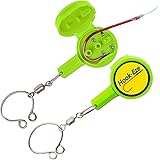Are you ready to catch the biggest bass in your lake? If so, then this article is for you. Bass fishing can be a challenging and rewarding sport that requires skill, patience, and knowledge of the water body. In this post, we will discuss foolproof techniques for catching the largest bass in your lake, tips and tricks for successful bass fishing, and conclude with final thoughts on bass fishing.
Introduction to Bass Fishing
Bass are freshwater fish found in lakes, rivers, and reservoirs across North America. They are known for their aggressive behavior and large size, making them a popular target among anglers. There are several species of bass, including largemouth, smallmouth, spotted, and striped bass. Each species has unique characteristics and habits that make them different from one another. To catch the biggest bass in your lake, it’s essential to understand their behavior and habitat.
Foolproof Techniques for Catching the Biggest Bass in Your Lake
1. Use Live Bait: One of the most effective ways to catch big bass is by using live bait. This technique involves hooking a live minnow or worm onto a hook and casting it into the water. The movement of the bait attracts hungry bass, which will strike at the opportunity to eat.
2. Use Lures: Another way to catch big bass is by using lures. These artificial baits mimic the movements of prey such as insects, frogs, and other fish. Some popular types of lures include crankbaits, jigs, and soft plastic baits. Experiment with different colors and sizes until you find what works best for your local bass population.
3. Choose the Right Time and Place: Bass are creatures of habit and tend to follow specific patterns throughout the year. During spring and summer months, they prefer shallow waters where they can spawn and feed on smaller fish. As fall approaches, they move deeper into the lake to escape colder temperatures. Understanding these behaviors allows anglers to predict where and when to catch bigger bass.
Tips and Tricks for Successful Bass Fishing
1. Keep Quiet: When fishing for bass, it’s essential to keep quiet and avoid sudden movements. Bass have excellent hearing and can detect vibrations in the water. A loud noise or sudden splash could scare off potential bites.
2. Use Light Tackle: For maximum sensitivity and control, use light tackle when fishing for bass. This includes thin line and a sensitive rod that can detect even the slightest nibble.
3. Practice Patience: Catching big bass takes time and effort. Don’t get discouraged if you don’t catch anything right away. Continue experimenting with different techniques and stay patient. Eventually, you’ll land the trophy bass you’ve been waiting for.
Conclusion: Final Thoughts on Bass Fishing
Bass fishing is an exciting and rewarding pastime that can provide hours of entertainment and challenge. By understanding the behavior of bass and implementing proven techniques, you too can catch the biggest bass in your lake. Remember to practice safety, respect nature, and always release any caught fish back into the wild. Good luck!































































